12 Best Event Ticketing Platforms for Conferences in 2025
Discover the 12 best event ticketing platforms for conferences. Our data-driven analysis helps you find the right solution for registration and sponsorships.
Choosing the right ticketing software is a critical first step in maximizing conference ROI. It's not just about selling tickets; it's about streamlining registration, gathering crucial attendee data, and creating a seamless, professional experience for both sponsors and participants. For conference organizers and corporate sponsorship managers, the platform selected directly impacts the ability to analyze attendee demographics, manage complex ticket tiers, and demonstrate tangible value to potential sponsors. A system with robust analytics and integration capabilities is a non-negotiable strategic asset for securing top-tier sponsorships.
This guide moves beyond generic feature lists to provide a detailed analysis of the best event ticketing platforms for professional conferences and B2B events. We focus specifically on the features that matter most to our audience: scalability for large-scale conferences, deep data integration for sponsorship reporting, and sophisticated attendee management tools. As the leading aggregator of conference and sponsorship data, our perspective is uniquely focused on how these platforms empower organizers to attract sponsors and prove their value.
Inside, you will find in-depth profiles of 12 top solutions, complete with direct links and screenshots. We break down pricing, pros, cons, and ideal use cases, giving you the practical insights needed to select a platform that aligns with your conference goals and elevates your sponsorship acquisition efforts.
1. Eventbrite
Eventbrite stands out as one of the best event ticketing platforms largely due to its massive, built-in marketplace. For conference organizers aiming to attract a broad, local, or niche audience beyond their existing network, this discovery engine is a powerful asset. It actively recommends events to users based on their interests and location, providing an organic marketing channel that few competitors can match. This is particularly beneficial for driving registrations for industry-specific workshops or regional business meetups, increasing the potential audience size you can present to sponsors.
The platform streamlines the entire event lifecycle, from creating a professional-looking event page in minutes to managing onsite logistics. The mobile organizer app is a key feature, enabling smooth attendee check-in and real-time sales tracking directly from your phone. This operational reliability is critical for maintaining a professional image at conferences and trade shows, which reflects positively on your event's sponsors.
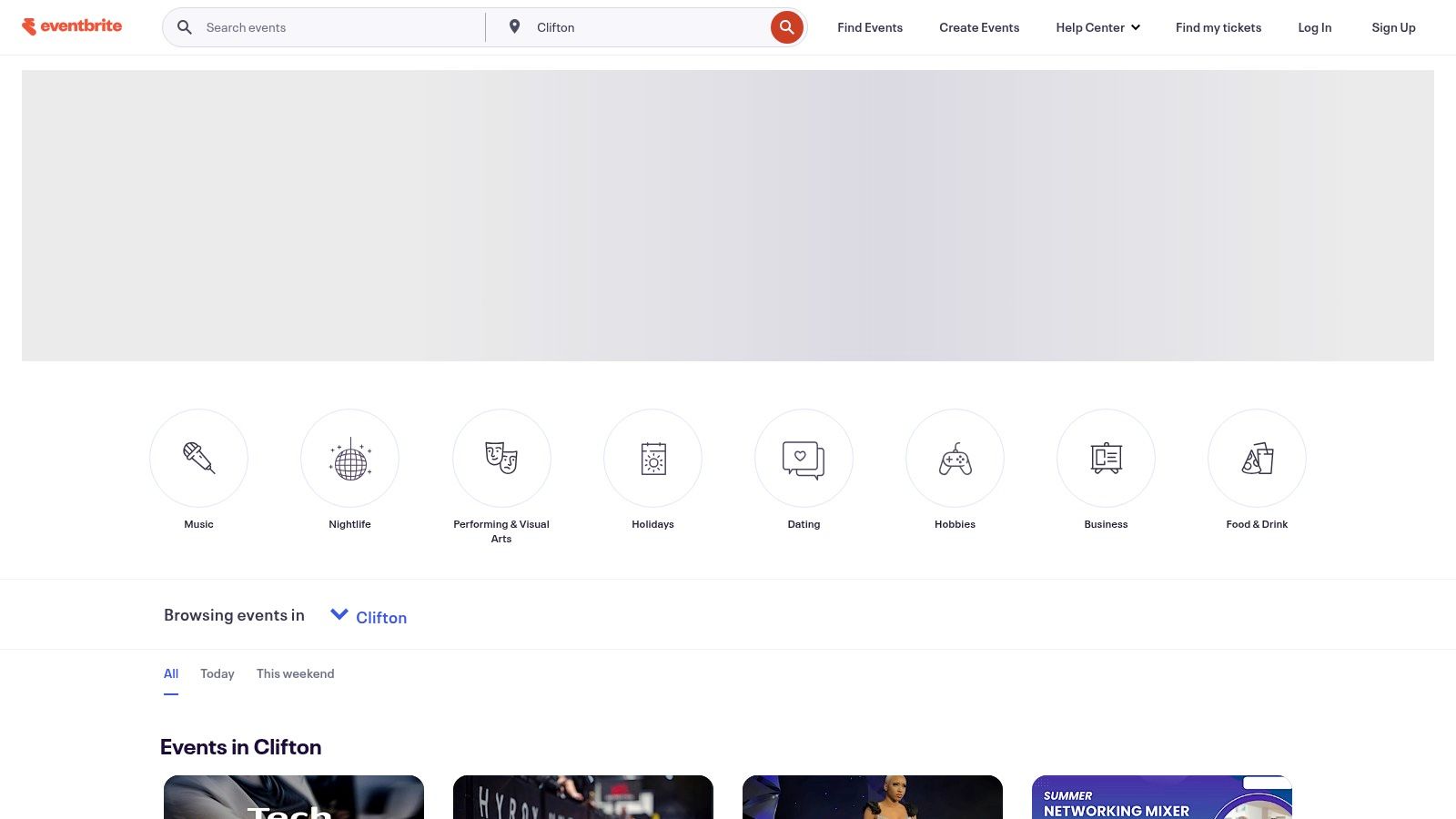
Key Considerations
- Best Use Case: Ideal for public-facing conferences, workshops, and local industry events where maximizing audience reach is a primary goal. Its simplicity also makes it a strong choice for organizers launching their first paid event.
- Pricing: Eventbrite is free to use for free events. For paid events, the fee structure in the U.S. typically includes a service fee and a payment processing fee per ticket sold. Nonprofit discounts are available.
- Limitations: While excellent for discovery, its fee structure can become costly for high-volume or high-priced corporate conferences. Data reporting for demonstrating deep sponsor ROI is less robust than more enterprise-focused platforms.
Website: https://www.eventbrite.com
2. Ticketmaster Business (TM1)
Ticketmaster Business (TM1) operates as the enterprise-grade backbone for major venues, professional sports teams, and large-scale concert promoters. Its power lies in sophisticated, seat-level inventory management and robust revenue optimization tools designed for complex, high-demand events. For large-scale conferences hosted in arenas or stadiums, this platform provides unparalleled control over reserved seating and secure digital ticket distribution. This is a key advantage when managing tiered access for sponsors, VIPs, and general attendees.
The platform offers a mobile-first digital ticketing ecosystem that streamlines entry management and reduces fraud, a key consideration for high-profile industry summits. Its real-time collaboration tools allow multiple stakeholders, from marketing to finance, to manage event creation and sales performance simultaneously. This level of granular control and reporting makes it one of the best event ticketing platforms for enterprise clients who require deep operational oversight and access to a massive consumer marketplace to boost attendance numbers for sponsors.
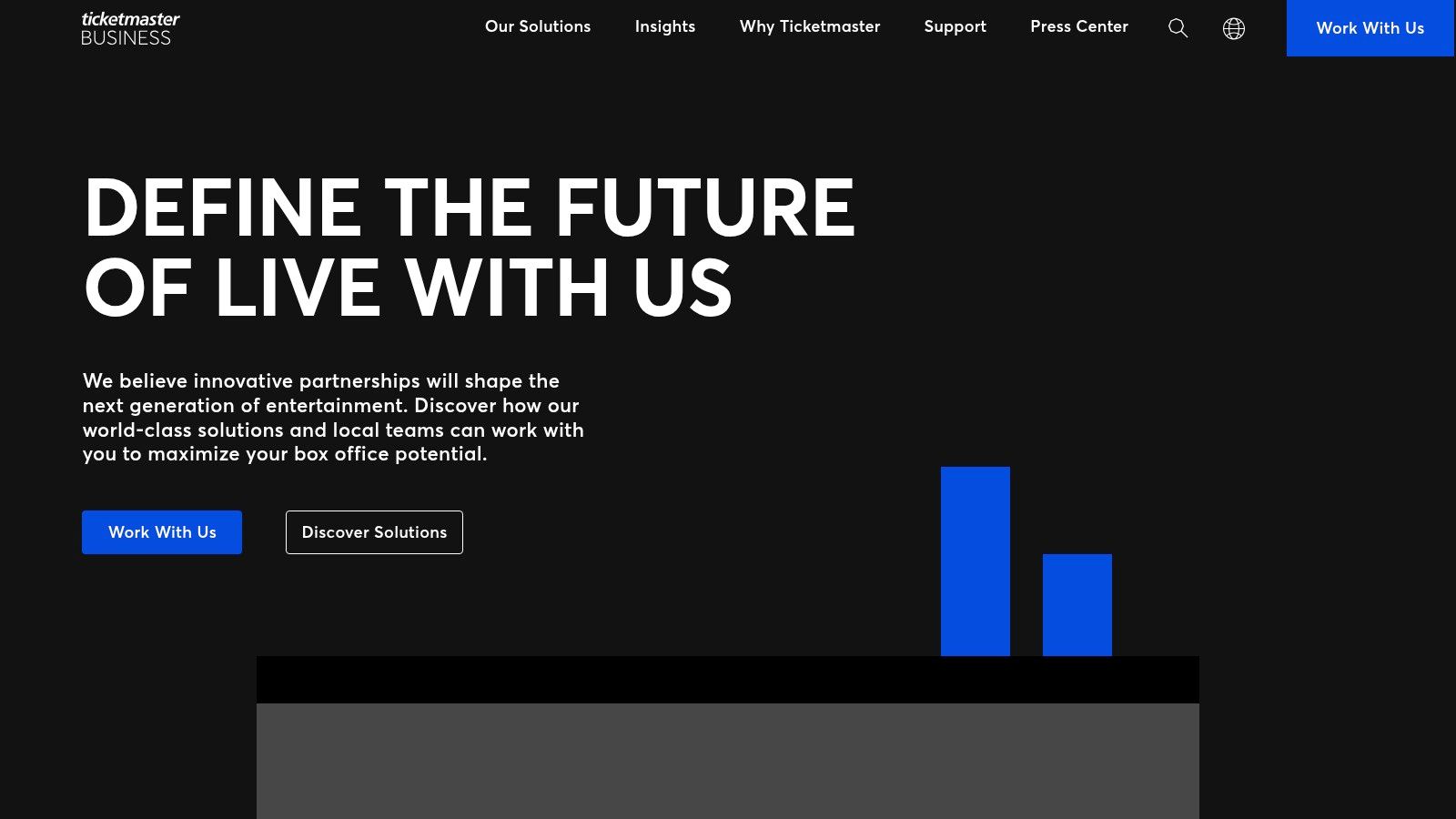
Key Considerations
- Best Use Case: Exclusively for enterprise-level conferences in large venues like stadiums, arenas, and theaters. It is ideal for industry trade shows that require intricate seat mapping and have significant public ticket sales components.
- Pricing: Requires an enterprise contract. Pricing is customized based on venue size, ticket volume, and specific service-level agreements. It is not designed for small or mid-sized conference organizers.
- Limitations: The high barrier to entry and complex contracts make it unsuitable for most independent or niche industry conferences. Its primary focus is on ticket sales volume, not necessarily on capturing the specific data needed for B2B sponsorship reporting.
Website: https://business.ticketmaster.com
3. AXS
AXS distinguishes itself as one of the best event ticketing platforms by focusing heavily on fraud prevention and identity-based access, a critical concern for high-demand corporate events and exclusive sponsored experiences. Its core technology, AXS Mobile ID, ensures only legitimate ticket holders gain entry. This level of security is paramount for organizers of large-scale trade shows or sponsored keynotes where ticket integrity directly impacts revenue and attendee safety.
For conference organizers, this system provides powerful, identity-verified data. Knowing exactly who is attending, rather than who initially bought the ticket, allows for more accurate CRM integration, post-event marketing, and precise sponsor ROI reporting. The platform's enterprise-grade analytics offer deep insights into attendee behavior, a significant asset when justifying sponsorship value and securing renewals.
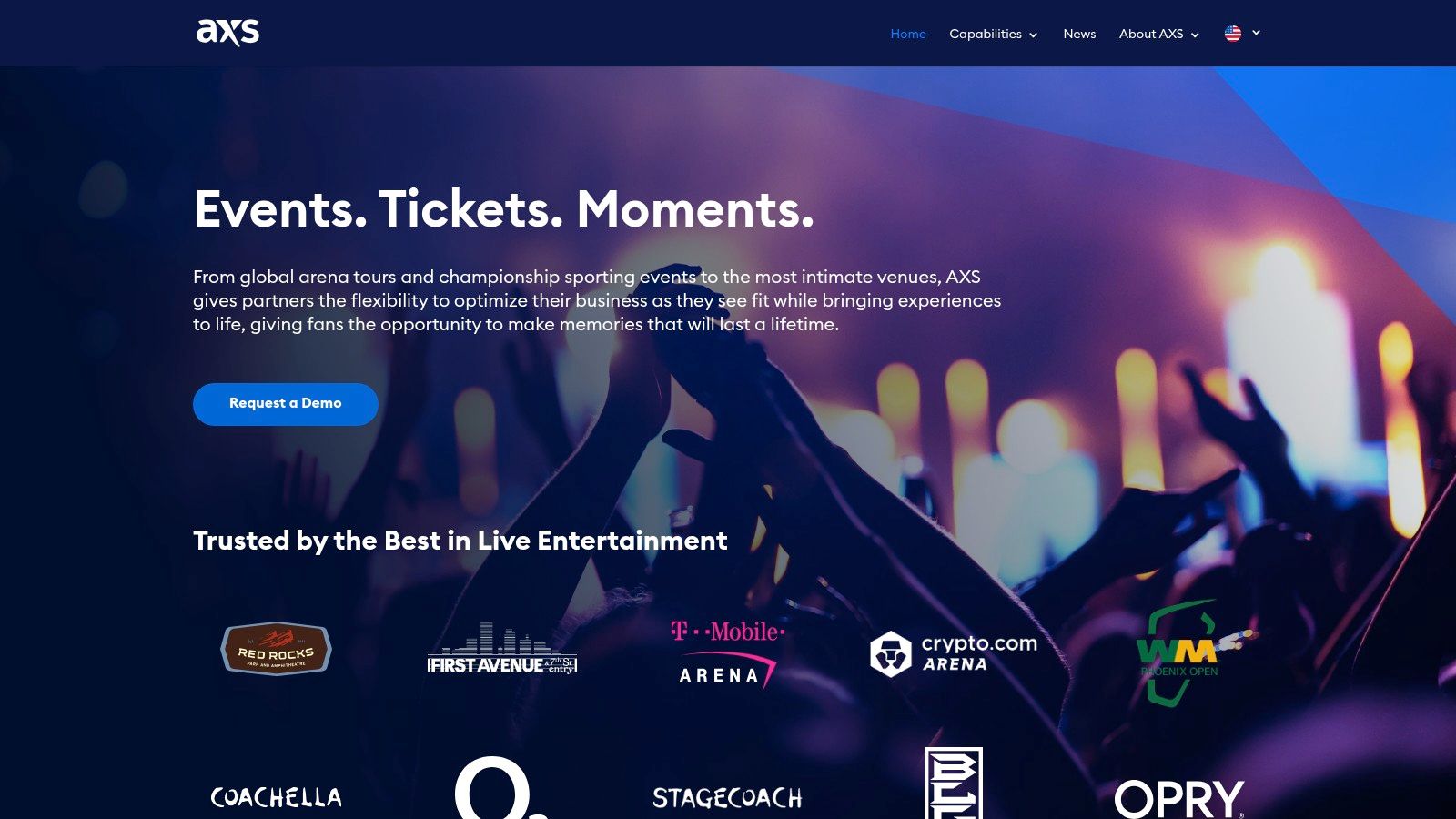
Key Considerations
- Best Use Case: Ideal for large venues, arenas, and exclusive corporate or sponsored events where ticket fraud is a major concern and capturing verified attendee data is a strategic priority for sponsorship reporting.
- Pricing: AXS operates on a custom, enterprise-level pricing model that is typically negotiated based on venue size, event volume, and specific service integrations.
- Limitations: The system's reliance on a mobile app can pose a barrier for some attendee demographics. Additionally, strict ticket transfer rules can sometimes create friction for corporate group ticket management, a key source of B2B conference attendees.
Website: https://solutions.axs.com/us
4. SeatGeek (Enterprise + Marketplace)
SeatGeek distinguishes itself with a dual-sided model that combines a high-quality consumer marketplace with a powerful backend for enterprise clients. This makes it a unique choice among the best event ticketing platforms, especially for large-scale conferences or trade shows held in major venues. Its primary ticketing software, SeatGeek Enterprise, is built for venues and offers robust data capture that goes far beyond simple barcode scans, providing deep insights into attendee behavior that can be packaged for sponsors.
The platform is renowned for its modern mobile user experience. Features like Rally, which integrates other services directly into the ticket, can significantly enhance the attendee experience at a large corporate event. This focus on a seamless, mobile-first journey from purchase to event day ensures a professional and tech-forward impression, which is critical when hosting industry leaders and demonstrating value to potential sponsors.
Key Considerations
- Best Use Case: Large conferences, trade shows, and corporate events hosted in stadiums or arenas already using SeatGeek Enterprise. It is ideal for organizers prioritizing a premium, mobile-first attendee experience to impress sponsors and VIPs.
- Pricing: The consumer marketplace has variable buyer and seller fees. Access to the SeatGeek Enterprise platform is available through direct, contracted partnerships with the venue or organization.
- Limitations: The enterprise-level features are not accessible for smaller, independent conference organizers. The platform is less suited for self-service event creation, focusing more on the venue than the specific needs of a B2B conference organizer.
Website: https://seatgeek.com
5. See Tickets (Eventim North America)
See Tickets operates as a full-service ticketing partner, making it one of the best event ticketing platforms for established conferences and large-scale industry events that require more than a simple DIY solution. Its strength lies in a flexible service model that scales from self-service tools for smaller industry shows to fully managed ticketing for major B2B exhibitions. This adaptability provides organizers with operational support that grows with their event's sponsorship program.
The platform offers robust infrastructure for both general admission and complex reserved seating events, complete with a dedicated box office app for professional on-site management. For conference organizers needing sophisticated campaign tracking, their managed services include social publishing and detailed tracking links, offering clear data on marketing ROI that can be tied to sponsorship packages. This combination of self-service capability and hands-on management makes it a powerful choice for events with significant sponsorship fulfillment needs.
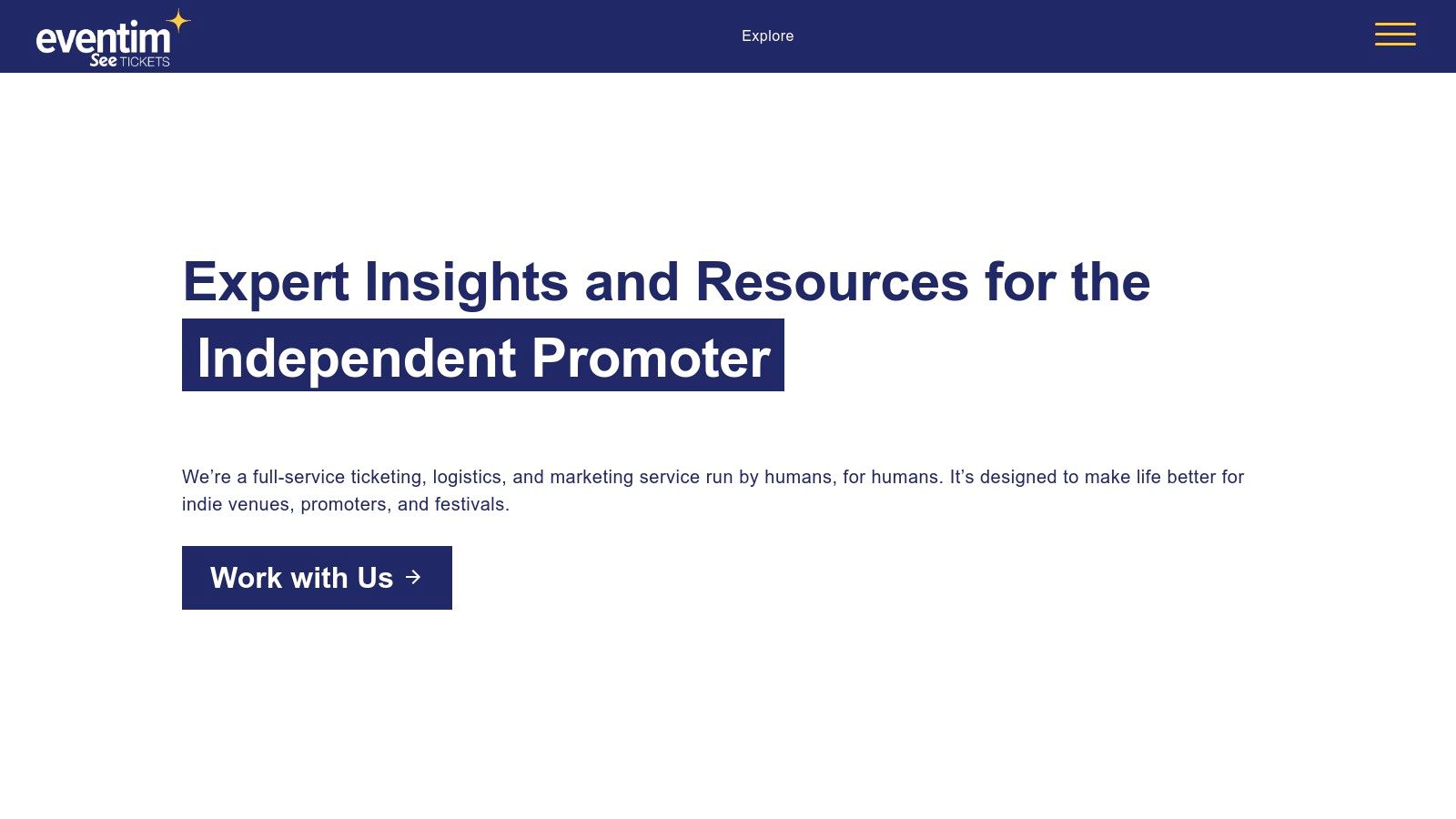
Key Considerations
- Best Use Case: Ideal for established conference series and industry trade shows that need a scalable ticketing partner with both DIY and managed service options to support a growing sponsorship program.
- Pricing: Pricing is not publicly listed and is typically customized based on the event's scale and the services required. This generally involves a consultation with their sales team.
- Limitations: The lack of transparent, upfront pricing makes it less suitable for organizers of emerging conferences needing a quick, simple setup. Its focus is broader than just B2B conferences, so some features may be less tailored to sponsorship needs.
Website: https://explore.seetickets.us
6. ShowClix
ShowClix carves out a niche among the best event ticketing platforms by focusing on the operational complexities of high-volume, attraction-based events. It’s engineered for environments like fan conventions and large festivals where managing throughput and complex admission rules is paramount. This operational focus is valuable for large industry expos where managing attendee flow through a sponsored exhibit hall is a key metric for success.
This operational focus is supported by a suite of hardware and on-site services. ShowClix provides everything from admissions scanners and RFID access control systems to a full box office app. For conference organizers managing multi-day, multi-venue events, this integrated hardware solution ensures that access control is seamless and data capture is reliable, providing sponsors with accurate foot traffic and session attendance numbers.
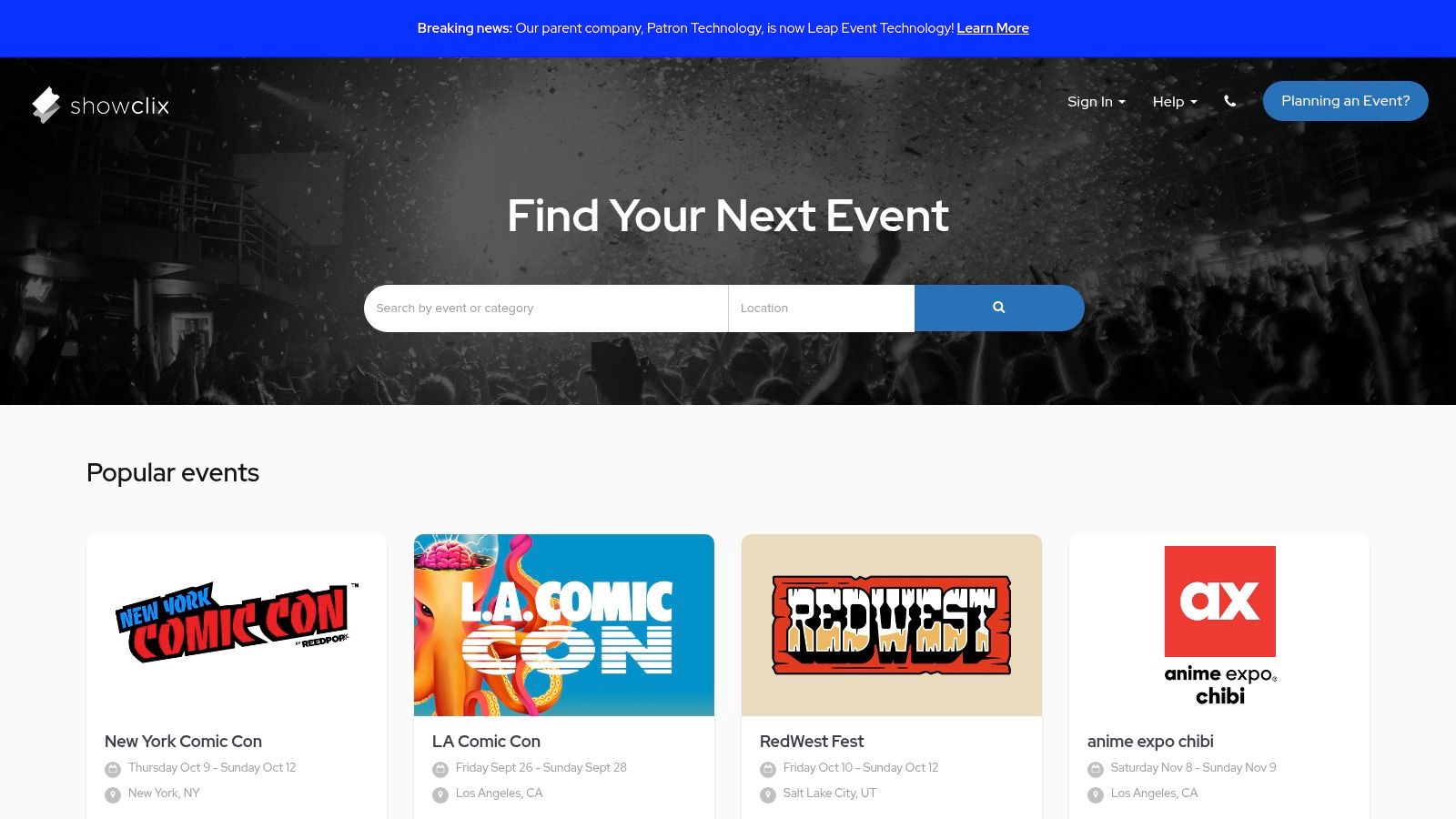
Key Considerations
- Best Use Case: Ideal for large-scale public conventions and industry expos that require sophisticated admissions logic, timed entry, and high-throughput hardware solutions to manage sponsored zones or stages.
- Pricing: ShowClix does not publish a flat fee schedule. Pricing is negotiable and customized based on event size, complexity, and hardware needs, which can be advantageous for large-volume organizers.
- Limitations: The lack of transparent pricing can be a hurdle for smaller conferences. The platform is built for operational efficiency, with less emphasis on the marketing and CRM integration features that are crucial for sponsorship sales funnels.
Website: https://www.showclix.com
7. Universe (a Ticketmaster company)
Universe, a Ticketmaster company, distinguishes itself by bridging the gap between user-friendly, self-service ticketing and enterprise-level distribution. This platform is an excellent choice for conference organizers who want an intuitive setup process but also value the option to scale their reach significantly. Its key advantage is the potential for optional distribution through Ticketmaster's massive network, offering a pathway to a much larger audience—a compelling selling point for potential sponsors.
The platform is designed with clear, organizer-friendly features, allowing for tiered ticketing, team permission controls, and the ability to sell directly on your own website or social media channels. This flexibility is crucial for corporate marketers managing multiple stakeholders and needing to maintain brand consistency across various sales points, including co-branded sponsor registration pages.
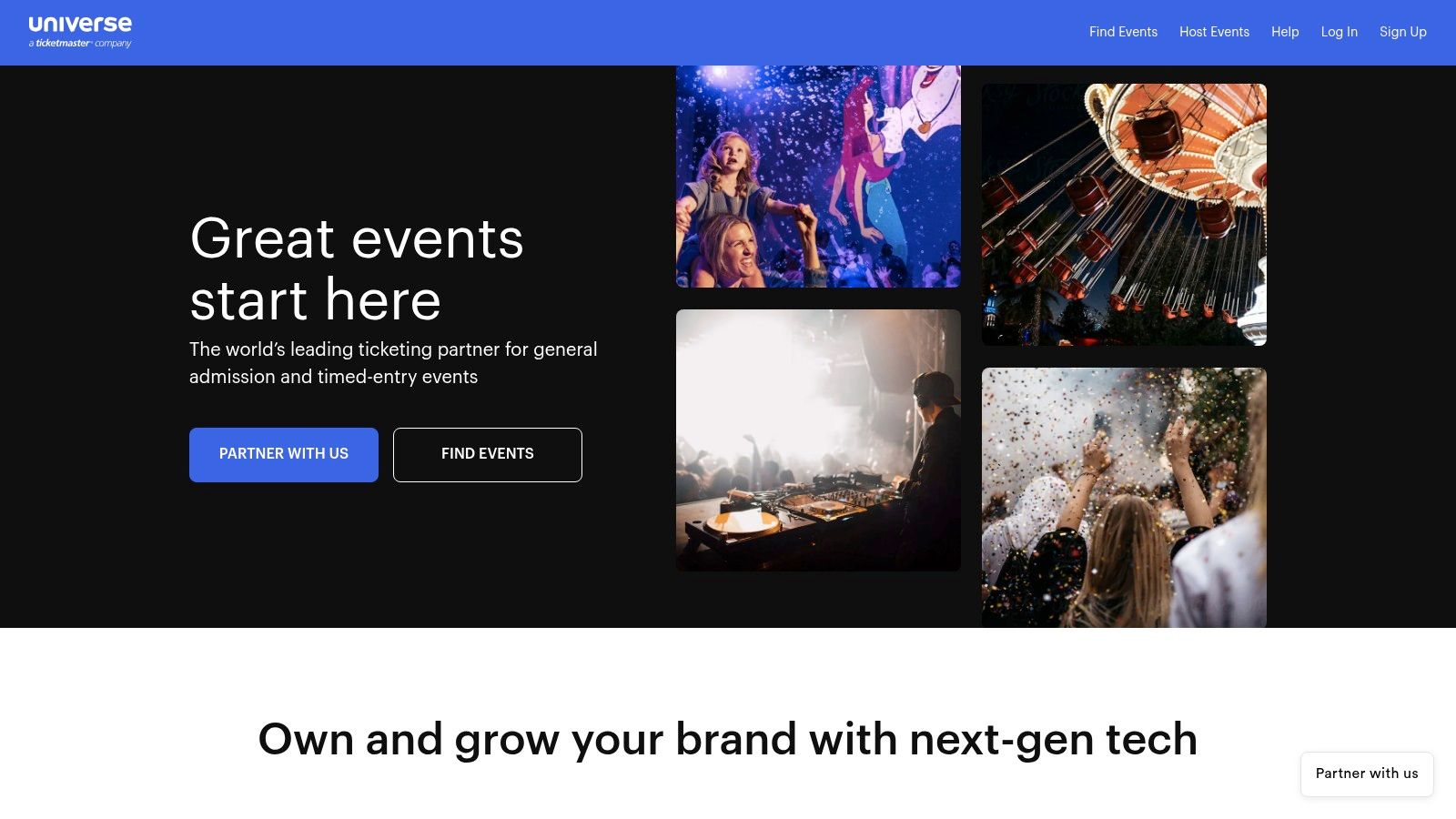
Key Considerations
- Best Use Case: Ideal for growing conferences or industry events that start with a core audience but have ambitions to expand their reach to attract larger sponsors.
- Pricing: Free for free events. Paid events are charged a transparent fee of 2% + $0.59 per ticket, with standard payment processing fees applied separately. Access to advanced features and Ticketmaster distribution requires a Pro plan.
- Limitations: The most powerful feature, Ticketmaster distribution, is not available on the basic plan and requires upgrading. Its native data analytics are less comprehensive than platforms built specifically for enterprise B2B event management.
Website: https://www.universe.com
8. Ticket Tailor
Ticket Tailor carves out its niche among the best event ticketing platforms by championing a budget-conscious, flat-fee pricing model. Instead of charging a percentage of each ticket, it applies a small, fixed fee, making it an incredibly cost-effective solution for niche industry conferences, workshops, and independent organizers. This predictable pricing allows for precise budget forecasting, freeing up capital that can be better invested in delivering value for sponsors.
The platform offers a clean, white-label experience, allowing organizers to embed the ticket-selling widget directly into their own websites for a seamless brand experience. This is crucial for maintaining a professional image and controlling the user journey, which is important when directing traffic from sponsor websites or co-marketing campaigns. Core functionalities like a free check-in app and multi-language support ensure a professional operation.
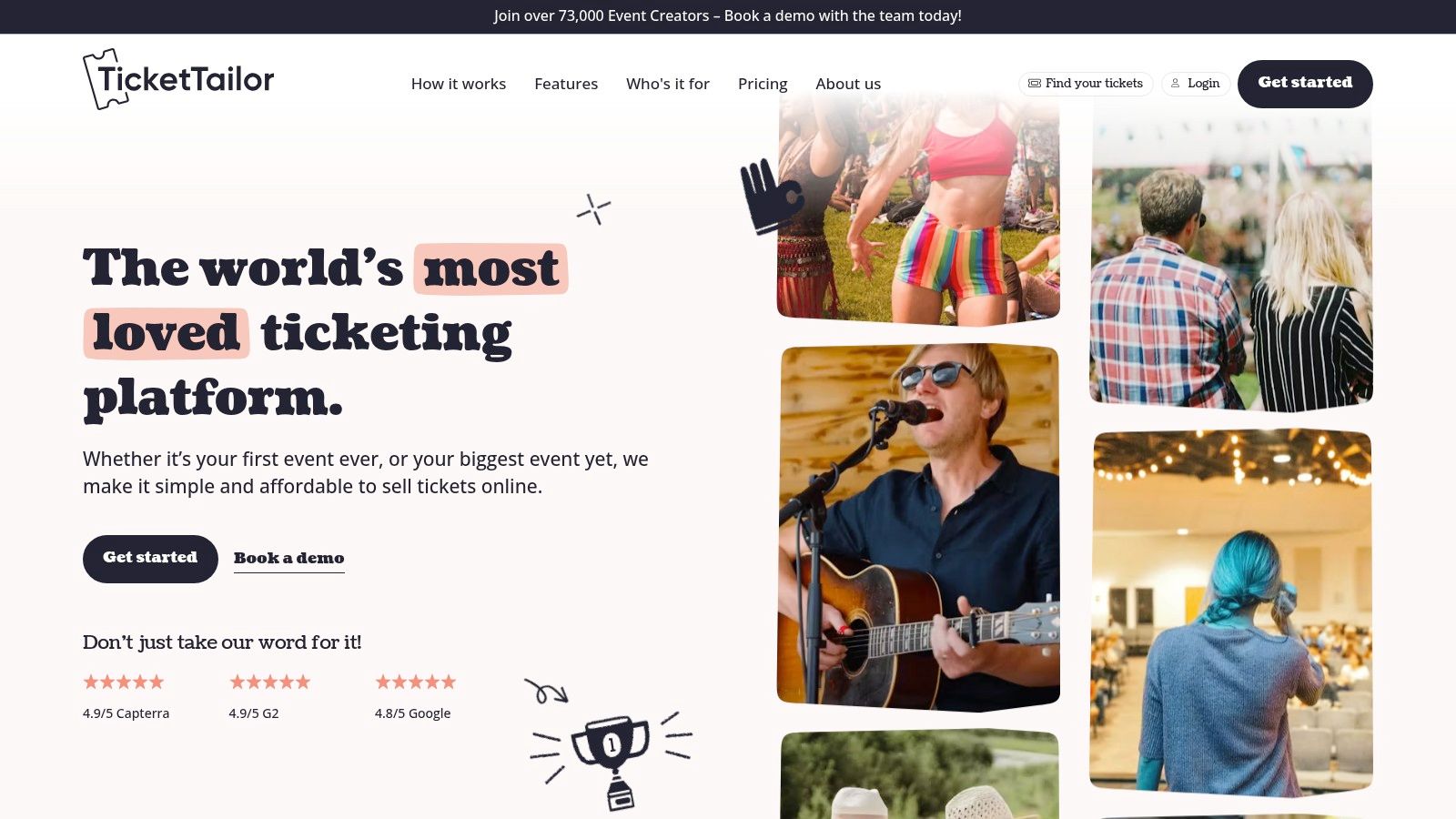
Key Considerations
- Best Use Case: Excellent for niche or independent B2B conferences, workshops, or seminars where keeping overhead low is paramount and sponsorship value is delivered through targeted engagement rather than sheer volume.
- Pricing: Free for free events. For paid events, you can either pay a small flat fee per ticket (starting around $0.60) or purchase prepaid credit bundles at a discount. Payment processor fees (e.g., Stripe, PayPal) are separate.
- Limitations: The platform lacks a built-in event marketplace or discovery engine, so it does not provide organic marketing reach. Organizers are fully responsible for driving their own traffic, which may require a separate marketing budget.
Website: https://www.tickettailor.com
9. Ticketleap
Ticketleap carves out its niche among the best event ticketing platforms by focusing on simplicity and transparent pricing, making it a strong contender for local or community-focused corporate events. Its primary strength is an exceptionally straightforward setup process, allowing organizers to go from concept to a live ticketing page in minutes. This is ideal for recurring training seminars or local industry meetups where the primary goal is efficient registration, not complex sponsorship activations.
The platform includes essential tools without overwhelming the user, offering free mobile apps for both ticket scanning and at-the-door sales. This mobile-first approach ensures a smooth check-in process, a key touchpoint for attendee and sponsor satisfaction. For organizers of smaller B2B gatherings, the predictable fee structure and quick post-event payouts provide financial clarity and efficient cash flow management.
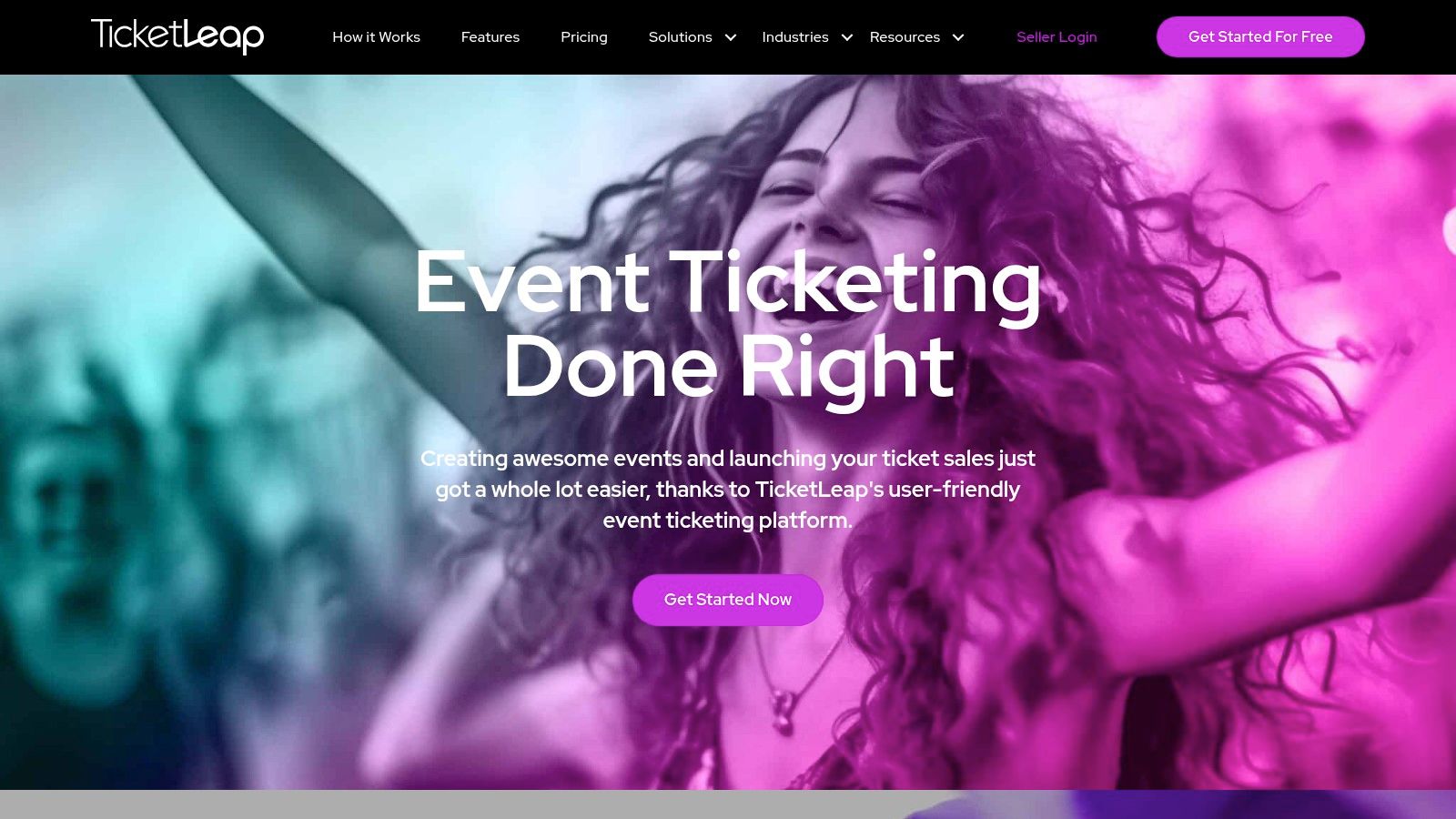
Key Considerations
- Best Use Case: Excellent for straightforward, U.S.-based events like local business workshops and community meetups where ease of use and low, transparent fees are the top priorities.
- Pricing: For tickets over $5, the fee is $1 + 2% per ticket. For tickets $5 or less, it's a flat $0.49. Organizers can choose to absorb these fees or pass them on to attendees.
- Limitations: The feature set is intentionally lean, lacking the advanced CRM integrations, marketing automation, and robust analytics required to prove ROI for major sponsorship deals. It's built for transactions, not for deep B2B event management.
Website: https://www.ticketleap.com
10. Cvent
Cvent positions itself as a comprehensive, enterprise-grade event marketing and management solution, making it one of the best event ticketing platforms for large-scale corporate programs. It moves beyond simple ticketing to offer an integrated ecosystem for the entire event lifecycle. For conference organizers managing complex, multi-track events, Cvent provides tools for everything from building branded registration websites and managing attendee data to deploying mobile event apps with clear sponsor visibility.
The platform’s real power lies in its deep integration capabilities with CRM and marketing automation systems like Salesforce and Marketo. This allows sponsorship and marketing teams to seamlessly track the event's impact on sales pipelines and prove ROI. This level of data-driven insight is critical for securing executive buy-in and optimizing future sponsorship strategies for major industry conferences.
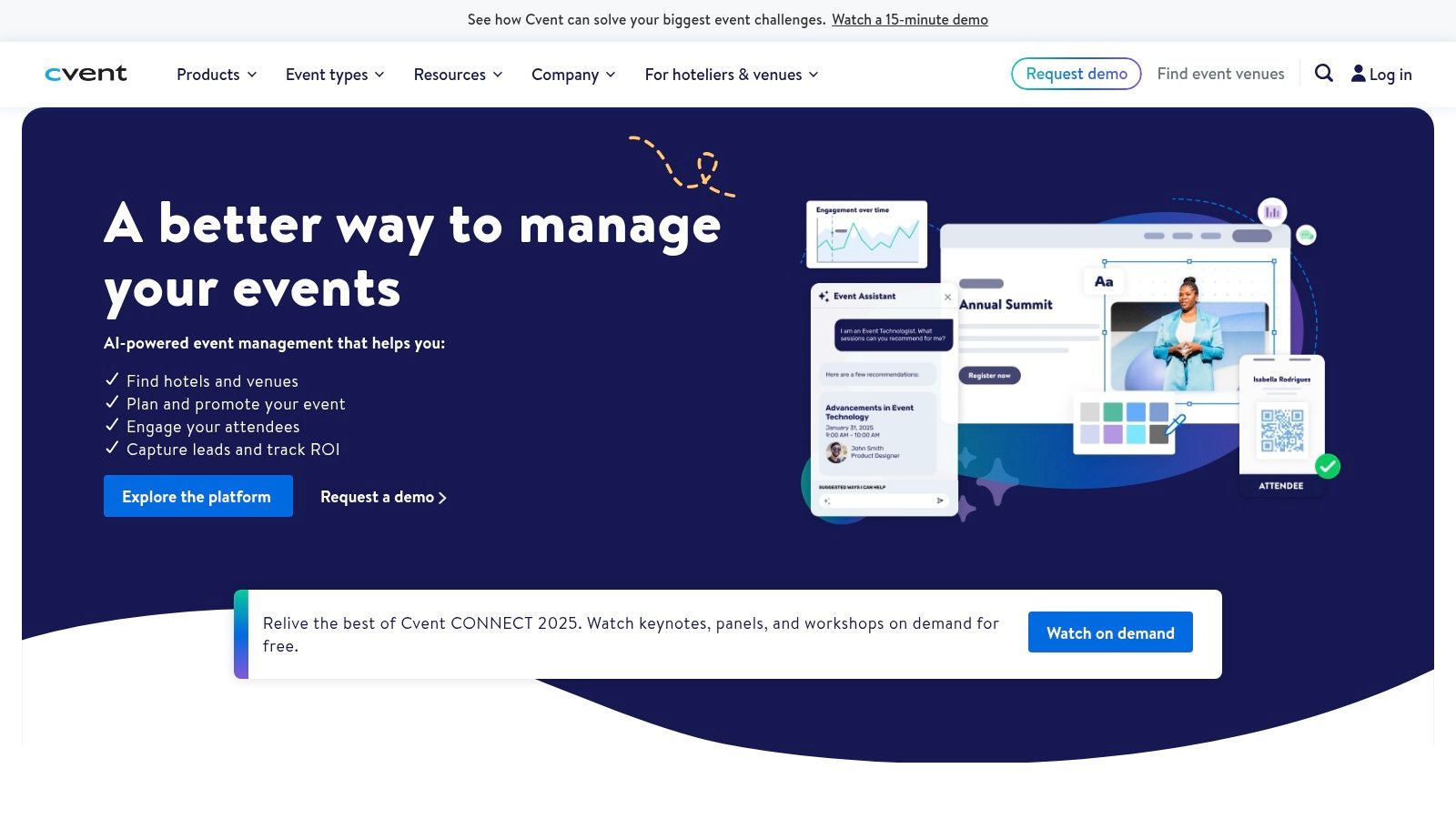
Key Considerations
- Best Use Case: Ideal for mid-market to large enterprises hosting complex conferences and trade shows that require deep data integration, robust analytics, and extensive customization to manage and report on sponsorship programs.
- Pricing: Cvent operates on a custom, modular pricing model based on features, event size, and usage. It generally requires a significant investment and is tailored for professional conference organizers with substantial budgets.
- Limitations: The platform’s complexity and cost make it unsuitable for small businesses or simple, single-ticket events. The extensive feature set can present a steep learning curve for teams without a dedicated event manager.
Website: https://www.cvent.com
11. Accelevents
Accelevents positions itself as a comprehensive, all-in-one platform tailored for professional event organizers managing large-scale conferences and trade shows. It excels by integrating registration, onsite logistics, and robust virtual/hybrid event capabilities into a single ecosystem. For conference organizers seeking to monetize sponsorships, its exhibitor management tools are a significant asset, providing dedicated virtual booths and lead retrieval functionalities that demonstrate clear ROI to sponsors.
The platform is designed to handle complexity, offering a streamlined interface for both organizers and attendees. Its clear pricing structure and dedicated 24/7 customer support make it a reliable choice for high-stakes corporate events where dependable technology and service are non-negotiable. This level of support is a key differentiator, ensuring smooth execution of complex sponsorship activations.
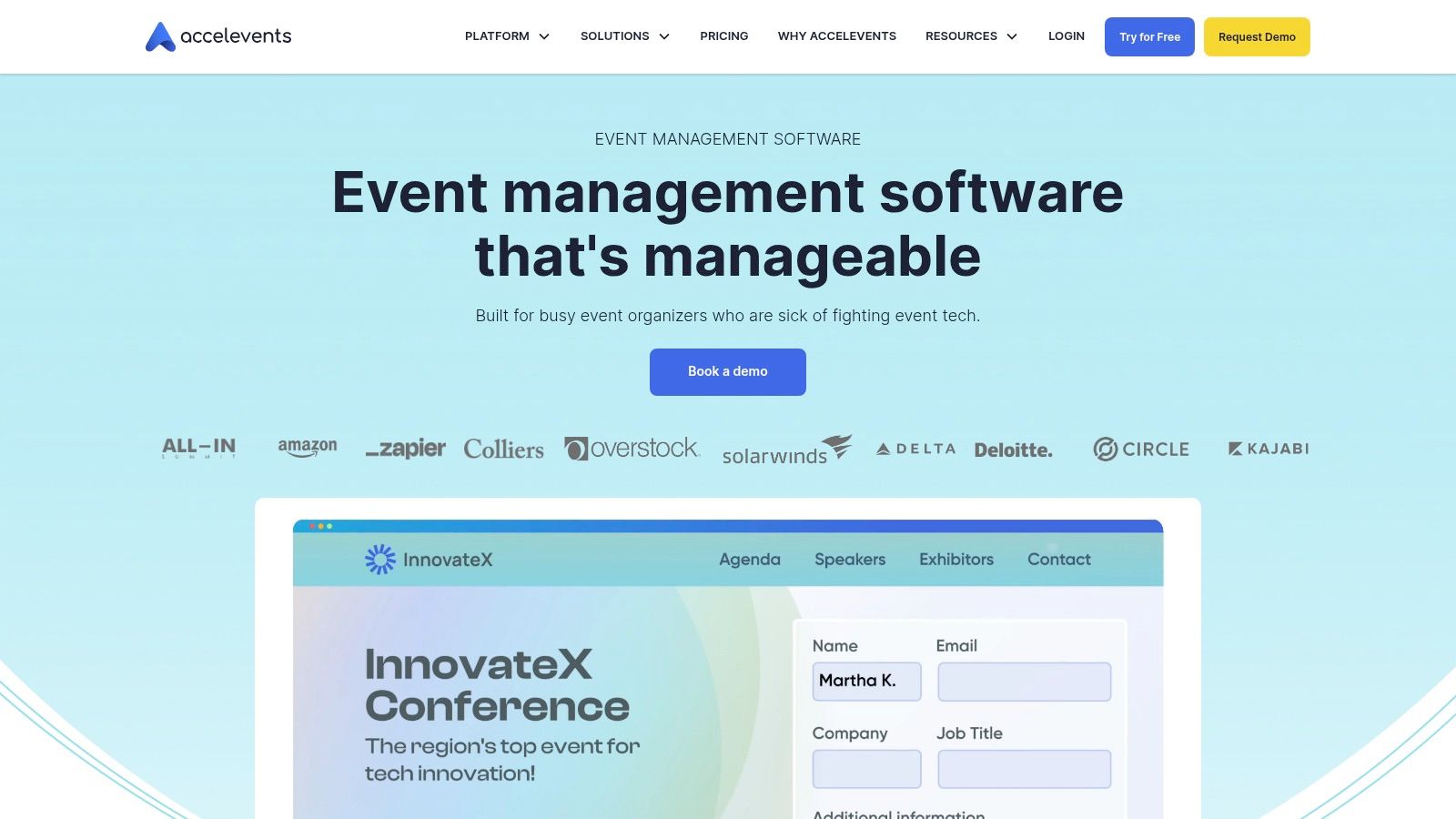
Key Considerations
- Best Use Case: Ideal for enterprise-level conferences, trade shows, and hybrid events that require a unified solution for ticketing, attendee engagement, and robust exhibitor/sponsor management.
- Pricing: Plans are built for professional use, starting around $7,000 for a single event and scaling to unlimited event packages. This structure is designed for organizers managing significant event budgets and sponsorship revenue.
- Limitations: The premium pricing model makes it less suitable for smaller organizations or emerging conferences. Its extensive feature set may be overly complex for simple, single-session workshops.
Website: https://www.accelevents.com
12. Splash
Splash differentiates itself as an event marketing platform where ticketing is a core component of a larger, brand-centric strategy. For corporate marketers and sponsorship managers, its strength lies in creating visually stunning, on-brand event pages that integrate seamlessly with CRM and marketing automation systems. This ensures that every registration feeds directly into sales funnels, providing measurable ROI that can be directly attributed to the conference.
The platform empowers teams to manage an entire event program, not just a single ticketed event. Its design capabilities allow for consistent branding across multiple conferences, while features like discount codes and affiliate ticketing options provide the flexibility needed for complex sponsorship activations and partnership campaigns. This is crucial for demonstrating a premium, professional experience to sponsors and their invited guests.
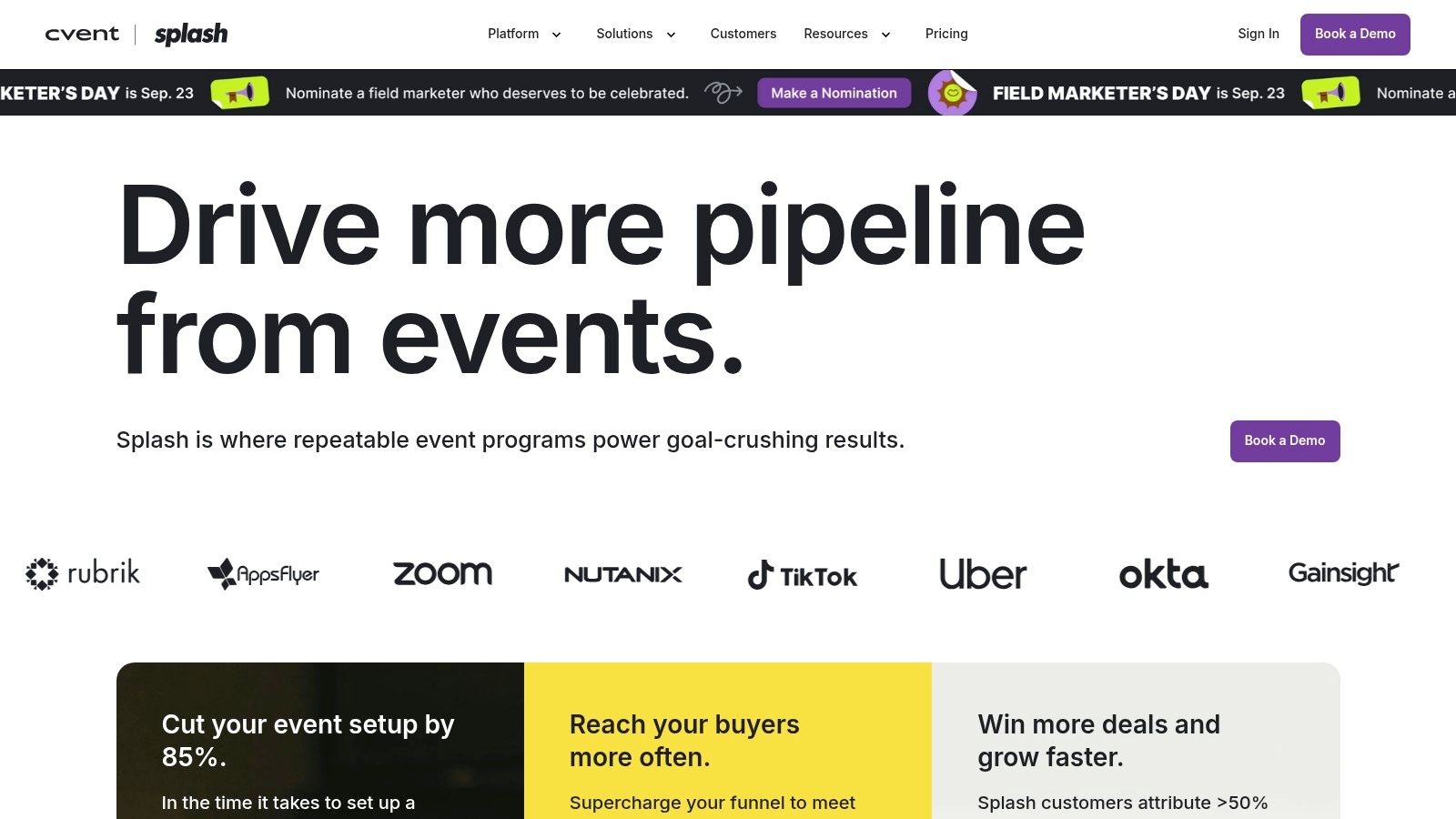
Key Considerations
- Best Use Case: Corporate conference teams who require deep brand control, powerful design tools, and direct integration with their existing martech stack (like Salesforce or Marketo) to prove sponsorship and event ROI.
- Pricing: A free plan is available with basic features. Paid plans (Pro and Enterprise) unlock advanced integrations and support, with pricing provided through a sales-led process.
- Limitations: The lack of transparent, per-ticket pricing makes it less suitable for organizers seeking a simple, transactional ticketing solution. The platform's extensive marketing features are overkill for a single, small-scale conference.
Website: https://splashthat.com
Top 12 Event Ticketing Platforms Comparison
| Platform | Core Features & Unique Selling Points ✨ | User Experience / Quality ★★★★ | Value Proposition & Pricing 💰 | Target Audience 👥 | Highlights 🏆 |
|---|---|---|---|---|---|
| Eventbrite | Marketplace discovery, embedded checkout, mobile check‑in app | Broad audience reach, fast event setup | Free events no fees; fees higher on low-price tickets | Local event organizers, classes | Huge audience, nonprofit discounts |
| Ticketmaster Business | Advanced seat mapping, real-time inventory, mobile-first digital tickets | Enterprise-grade tools, massive consumer demand | Enterprise contracts; fee policies under scrutiny | Large venues, promoters, teams | Best for arenas, deep tooling |
| AXS | Mobile ID with rotating QR codes, identity verification, integrated resale | High fraud resistance, streamlined mobile entry | Free fan app required, resale rules vary | Teams, venues, tours | Strong security, CRM data capture |
| SeatGeek | Enterprise + marketplace, all-in transparent pricing, fan engagement (Rally) | Excellent mobile UX, innovative engagement | Variable fees, enterprise requires contract | Major U.S. teams, venues, consumers | Fan engagement, biweekly software updates |
| See Tickets | Self-service + managed services, box office app, social publishing | Flexible DIY to managed, strong festival footprint | No public fee schedule | Festivals, venues, promoters | International presence, strong venue support |
| ShowClix | Admissions hardware, RFID access, timed entry, marketing tools | Built for high-throughput, complex admissions | Negotiable fees; hardware adds cost | Attractions, museums, festivals | RFID control, onsite operations |
| Universe (Ticketmaster) | Transparent pricing (2% + $0.59), team roles, social sales, Ticketmaster Pro distribution | Organizer-friendly, scalable with pro features | Clear fees; free events no fees | DIY events, growing organizers | Simple pricing, Ticketmaster distribution |
| Ticket Tailor | Flat fee per ticket (~$0.60), free tier for free events, reserved seating | Low organizer cost, multi-language support | Lowest costs; separate payment fees | Nonprofits, SMBs, small-medium events | Flat fees, charity discounts |
| Ticketleap | Transparent fees ($1 + 2% or $0.49 flat), fast setup, Apple/Google Pay | Clear fees, free scan & payout apps | Low fees, no platform fees onsite | Local venues, seasonal attractions | Fast setup, fee flexibility |
| Cvent | Scalable registration, CRM integration, event diagramming, webinar tiers | Deep enterprise features, strong analytics | Custom pricing; not for small events | Mid-large enterprises, corporate | Modular system, compliance focus |
| Accelevents | Virtual/hybrid events, exhibitor management, onsite check-in, API/webhooks | Strong customer support, hybrid-ready | $7,000+ entry, clear tiered pricing | Professional conferences, trade shows | Hybrid events, 24/7 support |
| Splash | Brand controls, multi-currency, CRM sync, mobile check-in | Scalable from free to enterprise, strong analytics | Sales-led pricing, no public fee schedule | Marketing teams, branded events | Design focus, marketing automation |
Making a Data-Driven Ticketing Decision
Selecting from the list of the best event ticketing platforms is more than a logistical choice; it's a strategic decision that directly impacts your conference's profitability, attendee experience, and sponsorship value. As we've analyzed, the landscape is diverse. Platforms like Cvent and Accelevents excel in the enterprise space, offering robust data analytics and CRM integrations crucial for corporate events focused on maximizing sponsorship ROI and tracking attendee journeys. These tools transform ticketing from a simple transaction into a rich data-gathering operation for your sponsorship team.
On the other hand, platforms such as Eventbrite and Universe provide accessible, powerful solutions for organizers who need broad reach and user-friendly interfaces to build an audience attractive to sponsors. For those prioritizing lower costs, independent players like Ticket Tailor offer a compelling model that maximizes net revenue. The critical takeaway is that there is no single "best" platform. The optimal choice is the one that best supports your conference's specific sponsorship strategy.
Key Factors for Your Final Evaluation
Before committing to a platform, your team must conduct a final assessment based on these critical pillars for conference sponsorship:
- Data and Analytics: Does the platform provide granular data on attendee demographics, registration sources, and ticket-type performance? Your ability to segment audiences and demonstrate value to sponsors begins here. A platform that offers deep analytics is a strategic asset.
- Sponsorship Integration: How does the platform facilitate sponsor visibility? Look for features like tiered ticketing with sponsor branding, dedicated sponsor landing pages, and post-event reporting that you can share with your partners to prove their ROI.
- Scalability and Support: Will the platform grow with your event and its sponsorship program? Consider its capacity to handle high-volume traffic and the level of technical support offered. An enterprise-level conference cannot risk a system crash during peak registration.
- Total Cost of Ownership: Look beyond the per-ticket fee. Factor in payment processing charges, subscriptions, and the cost of any necessary add-ons. A seemingly cheap platform can become expensive if it lacks the features needed to attract and retain high-value sponsors.
Implementing Your Chosen Platform
Once you've made a selection, successful implementation hinges on a strategic rollout. Your decision is part of a larger sponsorship ecosystem. For instance, understanding the effectiveness of PPC paid ads for marketplaces can inform how you drive traffic to your new ticketing page, ensuring your investment generates maximum visibility and ticket sales to build an attractive audience. Integrate the platform with your existing CRM tools early to create a seamless data flow. This integration is vital for nurturing leads, personalizing communications, and providing sponsors with actionable insights into the audience they are reaching.
Ultimately, the best event ticketing platforms serve as the central hub for your conference's operational and financial data. By choosing wisely, you empower your team to not only sell tickets efficiently but also to build a data-driven foundation that proves value, attracts sponsors, and ensures a profitable event for years to come.
Ready to find the high-value sponsors who will attend your next conference? ConferenceDatabase provides the most comprehensive data on conference sponsors, helping you identify and connect with the right partners for your event. Use our platform to benchmark your conference and supercharge your sponsorship sales pipeline.